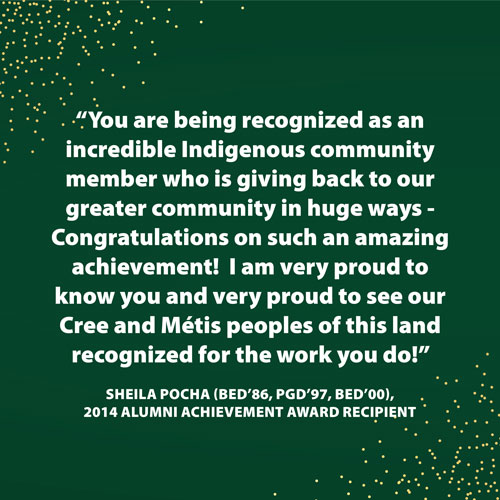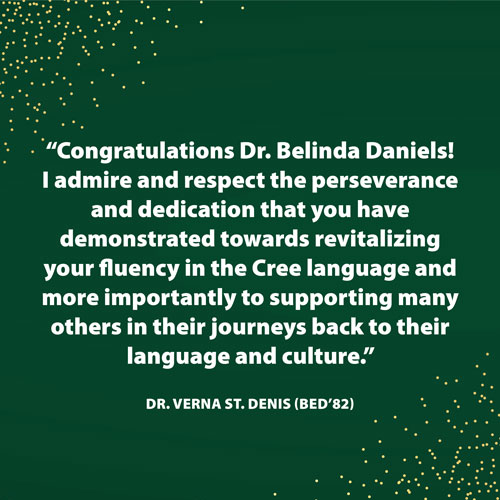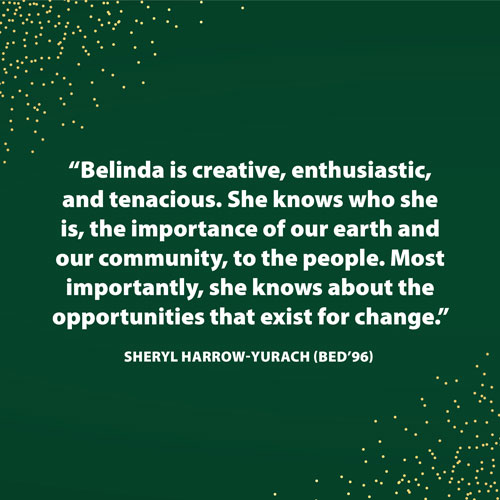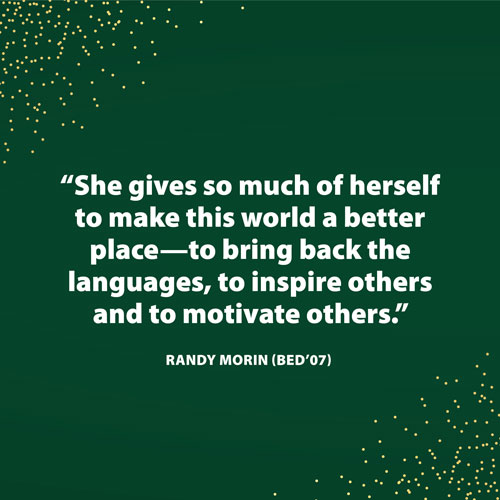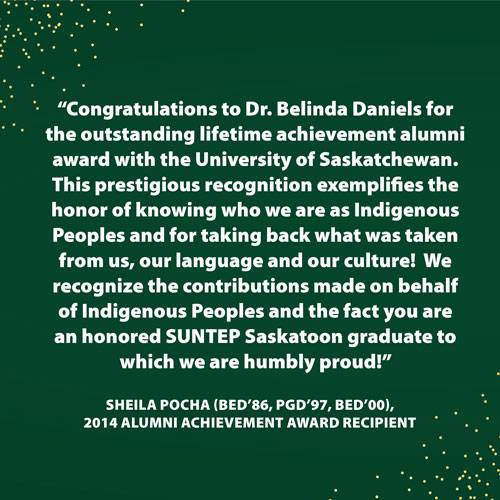Belinda Daniels is a 2023 recipient of the Lifetime Achievement Award.
As the highest honour presented by the University of Saskatchewan Alumni Association, this award recognizes an alumnus/alumna for an outstanding lifetime of personal and professional accomplishments and contributions to the social, cultural, and economic well-being of society in their field(s) of endeavor.
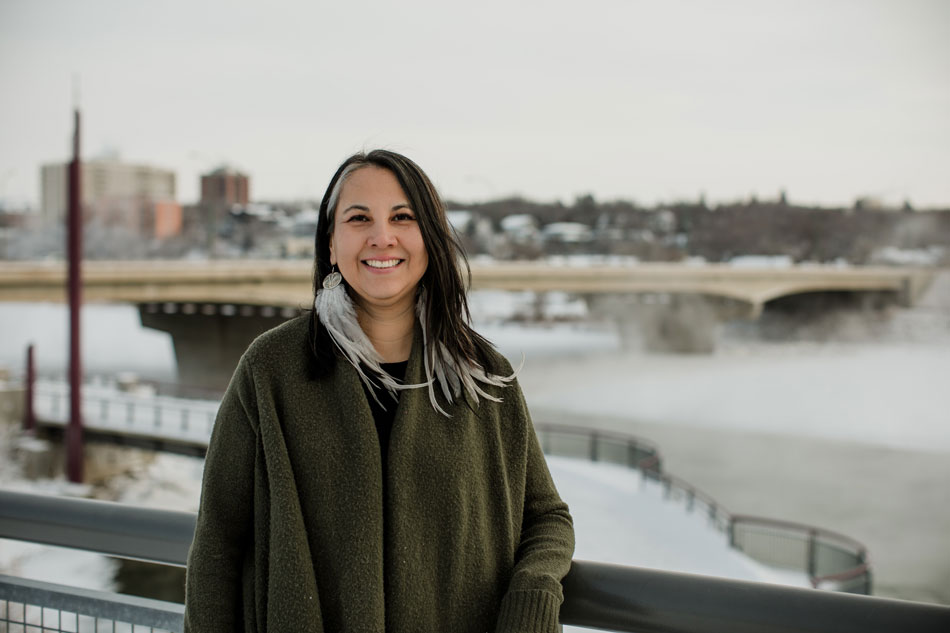
By Connor Jay
Dr. Belinda kakiyosēw Daniels (PhD) has been recognized with a University of Saskatchewan (USask) Alumni Lifetime Achievement Award for her work reconnecting current and future generations with Cree language and culture.
Daniels is a nēhiyaw from pakitahwākan sākahikan - Sturgeon Lake First Nation, Saskatchewan. She is a mother, grandmother, teacher and leader who grew up in a culturally-rich environment that connected strongly with the land. She absorbed the depth and breadth of the Cree culture that surrounded her formative years.
“I was very aware of living on and with the land,” reflected Daniels. “Looking back, I am appreciative and grateful for what the land did for us as a family and as a community. We grew huge gardens in the summertime, picked berries and harvested wood deadfall from the forest for winter fires to heat our home.”
Daniels credits her grandparents for her deep connection to Cree way of living. Her grandparents allowed her to discover Cree traditions and spaces through ways of being, doing, and knowing, also specific cultural customs and ceremonies. They provided the foundational values and attributes that Daniels would build upon.
“My grandparents demonstrated humility, gratitude, generosity and sharing. These are pivotal values in our home. I didn't grow up rich in terms of money, but I was rich in funds of nēhiyaw cultural knowledge,” said Daniels.
Daniels first attended USask in 1994 to pursue a Bachelor of Education (BEd) degree through the Saskatchewan Urban Native Teacher Education Program (SUNTEP). She enjoyed the core group she was able to study and work with during the four years of her undergraduate program. She especially valued the friendships and deeper relationships because of the continued support system they provided.
“It was advantageous having a core group of classmates work together. When we were hired into the school divisions, we were able to lean on each other for support. We continue to do so. I’m still very good friends with a small group of people I went to university with,” Daniels recalled.
Following her graduation in 1998, Daniels took a role as a teacher consultant in the Greater Saskatoon Catholic Schools division. Daniels decided to pursue a master’s degree because she knew there was more learning and unlearning to commit to. In 2002, she returned to USask to begin in Open Studies, which then led her to a master’s program through the Department of Educational Foundations in the College of Education.
“I was able to unravel and unlearn colonial ways of thinking which really suited the way I was raised. The master’s degree allowed me to go back to the land and learn language from Cree people on Cree territory in the way that was normal for me,” shared Daniels.
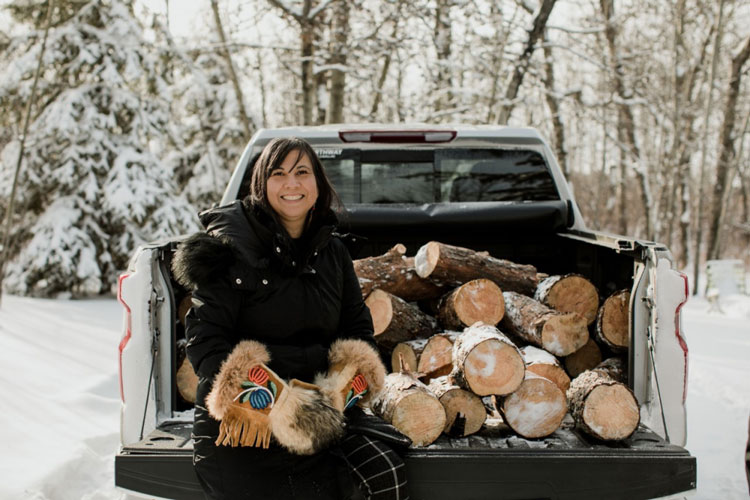
Daniels describes language as paramount to nēhiyawak identity. The language opens a connection to the land, a philosophy filled with tradition, custom, and natural laws that makes Indigenous people unique in their belonging in the world.
“I was naturally inquisitive and curious as a young child, being very aware of the languages that my grandparents spoke to other people, which wasn't in English, but Cree, both dialects of Woodland Cree and Plains Cree and Michif. I was very aware of the different languages they could speak. I thought it was fascinating. I wanted to speak Cree to them and wanted them to speak Cree to me,” said Daniels. “However, they held the language back because of the residential school trauma. They didn't want to inflict any of that pain onto me.”
During her undergraduate degree, Daniels took a Cree language class. In doing so, she was able to connect with her grandparents on another level. This was a positive revitalization of the language as opposed to the post-traumatic stress disorder her grandparents felt when she was a child.
“I saw that Cree classes were being offered. When I shared my course load with my grandparents, they were in awe and very proud of that fact that I was taking Cree classes in university. They were so joyful; I think my grandfather had tears in his eyes. They were my first teachers of the language, although indirectly and informally. They were my mentors. And I've had many after that. Currently, I still have an amazing circle of Cree speakers around me including my Ermine family back home,” Daniels said.
With her Cree language skill set enhanced and her motivation to share knowledge, Daniels founded and organized the nēhiyawak Language Experience Immersion Camps (nehiyawak Language Experience) in 2003. The not-for-profit organization offers a weeklong summer program with nēhiyawak ways of knowing, being and doing at the forefront. The goal at the end of the week is for learners to gain basic concepts of introduction, every day conversation and confidently tell a story in Cree, gain a stronger sense of Cree identity and Indigenous wellness, and reconnect with the land. The outdoor, land-based learning environment allows students to fully embrace the traditional teachings of storytelling, singing, beading, birch bark biting, harvesting and picking medicine, to name a few land-based activities.
“The camp is a holistic and experiential way of learning language and being on the land in a decolonial way,” explained Daniels. “Learners have come from across the country and as far away as France. We live together for a whole week, being truly nēhiyaw: living on the land, camping, and learning to practice speaking the language. This is where I'm grounded and where I feel nourished; my spirit is fulfilled and connected, this is home. This is healing. I belong here, we, as nehiyawak belong to the land.”
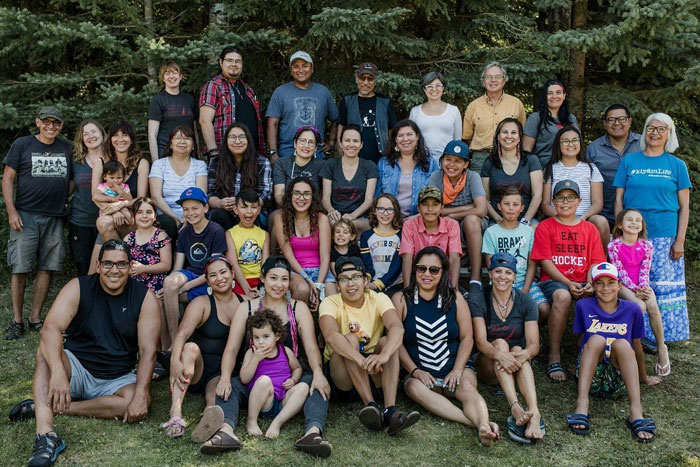
She wants fellow members of her community to become reacquainted with their language and learn self-sustaining practices by experiencing life with the land, acquire survival skills like hunting, fishing, trapping, harvesting, re-connect with traditional land-based knowledge because it has always been, and will continue to be, the future. Daniels is pleased with the longevity and legacy of the camps. The nehiyawak Language Experience has branched out into other programming, such as children, family camps, online learning and research.
“It is a part of our role as Cree people to mentor and to be good examples for community. I'm continuously influenced by the older generation who have inspired me to live the good life and that chain link reaction is what our youth need,” said Daniels. “In Cree the word and relationship for this passing on of knowledge is linked to our role and relationship as a great grandparent/child, the root word ‘capan’ for both extends to the relationship of being linked together and passing on of knowledge. This refers to a way of being and doing,” says Daniels.
Daniels has held teaching positions in Greater Saskatoon Catholic Schools and Saskatoon Public Schools and has received many recognitions, both locally and nationally, as well as from organizations throughout the world. In 2015, she was awarded the Outstanding Indigenous Educator Award by the Canadian Teachers Federation and in 2016, she was recognized internationally as one of 50 educators nominated for The Varkey Foundation Global Teacher Prize. The award, often referred to as the ‘Nobel prize of teaching’, recognizes exceptional teachers who are making outstanding contributions to the profession and have a positive effect in the community and on global stages. She was also recognized by the Federation of Sovereign Indigenous Nations for her exceptional work in Indigenous languages revitalization.
Randy Morin, assistant professor in Indigenous Studies at USask, speaks of the immense impact Daniels has had for him personally and professionally.
“Belinda’s work and research has made an incredibly important contribution to the field of Indigenous language revitalization. It is difficult to express what an immeasurable gift it is to find a pathway back to the Cree language,” said Morin.
Dr. Debbie Pushor (PhD), professor emerita in curriculum studies in the College of Education describes Daniels as a prolific connector and relationship-builder with others. Pushor was Daniels’ supervisor during her USask PhD in interdisciplinary studies. From a very early stage in her doctoral studies, Daniels was publishing articles and presenting at academic conferences internationally. Pushor noticed her determination, persistence, resiliency, and passion from the beginning.
“Professionally, I think she was one of the earl[iest] people in Saskatchewan to pursue language revitalization. She has been working on it as a teacher in the school system before becoming an academic and scholar. And she's been fierce. She's been ferocious in moving things forward,” said Pushor. “It really doesn't matter what gets in the way, bump here, obstacle there, she finds a way. No matter what happens, she smiles, she laughs and picks herself up and keeps going.”
The personal qualities and relationship-building nature is what truly sets apart Belinda kakiyosēw Daniels.
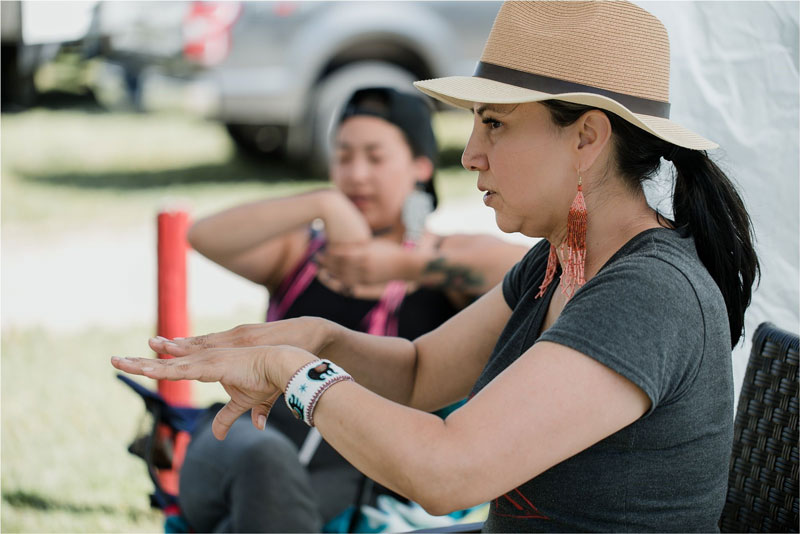
“Relationships are certainly something she says she believes in, but I see it lived in practice in so many ways,” continued Pushor. “She’s not just building a relationship with you just to have a relationship. She's established herself as a post-secondary educator and in the community in public education. It’s her networking in that communication and connection piece.”
Daniels completed her PhD in April of 2021 and started a faculty position specializing in Indigenous Language Revitalization at the University of Victoria in July of 2021. She wants others to know that it is possible to live and work for an institution while still being connected to the land and grounded. She has made and insisted this be a part of the job, which Daniels has done at University of Victoria. She shares these lived experiences with others because she is a firm believer in the connection of land with language. While completing her PhD at USask, she again found a network of colleagues that guided and mentored her.
“Dr. Debbie Pushor was very helpful in the completion of my dissertation. She is a great, loving, extraordinary supervisor. Dr. Priscilla Settee and Dr. Verna St. Denis are also amazing aunties in my Saskatoon community, along with Sheila Pocha. I was able to sit in their circles and listen to their experiences of what it means to be a professor and to work at an institution,” shared Daniels. “I also had extended exterior contacts like Dr. Andrea Sterzuk, who is a settler helping to dismantle pillars in institutions. Listening to this circle of professors has made me a better professor at the University of Victoria.”
As far as Daniels has already moved the needle for the Cree language, she knows more needs to be done for Indigenous Languages. She has progressed the work at the grassroots level, but recognizes the changes and inclusion needed at the systemic level.
“The current system doesn't connect to all people. It connects to certain types of people, but not all of us. I'm mentoring and leading in a decolonial way. And that is being true to my identity and my ancestors.” said Daniels. “I'm standing up in front of my home and in front of my community. In Cree this translates to onikanēw, she/he who leads and ‘I'm not going anywhere. We’re going to dismantle, we are going to break down structures, and change the rules to include all learners.’ This is what has made me who I am. I never accept, ‘no you can't do that.’ I've never accepted that.”
As to where Daniels wants to continue to lead with others, she believes the world needs more love, or ‘sâkihitowin’, right now, not just for humans, but for the planet itself. Through her work at the University of Victoria, she volunteers on numerous boards including the Foundation for Endangered Languages (FEL Canada), the Canadian Modern Language Editorial Board, and the Canadian Commission for UNESCO focusing on the Decade of Indigenous Languages. She takes pride in the journey so far, and the connections that surround her.
“I'm proud of my community. I'm proud of my children. I'm proud of this awakening of the language spirits. I'm proud of the people that come and join me on this language learning reclamation journey. I'm grateful for the opportunities and experiences and the places where I get to sit down, meet and visit with people who want to help make change. And I'm talking about all people, not just Indigenous people. I'm thankful for my connection with settlers who become accomplices and some of my best friends,” said Daniels.
Congratulations!
